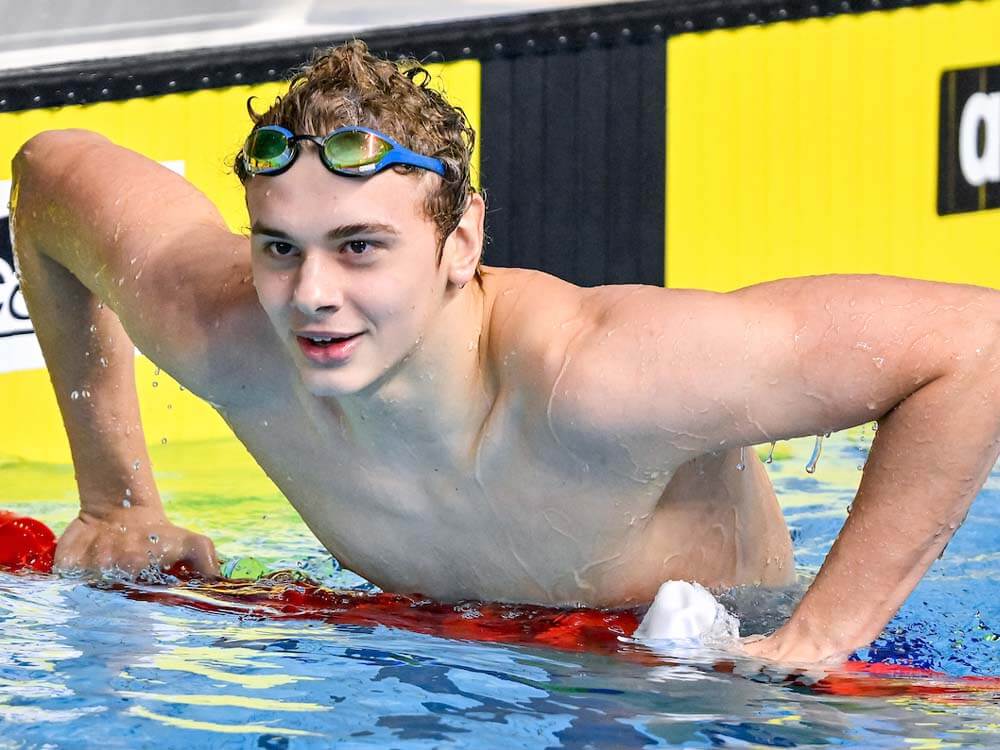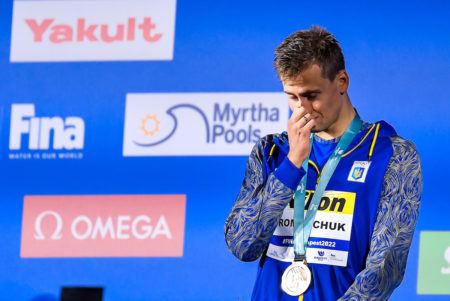Ascending Ukrainian Backstroker Oleksandr Zheltiakov Deserves Olympic Debut Without Russian Competition

Ascending Ukrainian Backstroker Oleksandr Zheltiakov Deserves Olympic Debut Sans Russian Competition
Without even attending this year’s senior-level World Championships, Oleksandr Zheltiakov has made a quick impression on the global backstroking scene. He swept 100 and 200 backstroke gold and took silver in the 50 back at the European Junior Championships in early July, and he matched those results exactly at last week’s World Junior Championships, with both silver medals coming in close finishes behind the Czech Republic’s Miroslav Knedla. His results this week in Netanya, Israel, earned Zheltiakov the title of top male swimmer of the meet.
The 17-year-old Zheltiakov will target his first Olympic Games next year, and he will have a chance at impact performances, particularly in the 200 back where his European Juniors time of 1:55.79 puts him in a three-way tie (with two older swimmers) for sixth in the world for 2023. Switzerland’s Roman Mityukov swam only 45-hundredths quicker in winning World Championships bronze in Fukuoka.
When Zheltiakov arrives in Paris to face off against the world in the biggest competition of his life so far, he will be proudly representing a country ravaged by turmoil and war since Russian and Belarusian forces invaded in early 2022. Any Ukrainian swimming success must be considered within the context of that conflict. Athleres have been forced to either live and train in essentially a warzone, with facilities coming under constant threat of Russian strikes, or relocate to continue their athletic exploits.

Ukrainian distance star Mykhailo Romanchuk — Photo Courtesy: Andrea Staccioli / Deepbluemedia / Insidefoto
For instance, Mykhailo Romanchuk, the most successful Ukrainian swimmer of the last decade, moved his training to Germany at the invitation top rival Florian Wellbrock, while Romanchuk’s wife, jumper Maryna Bekh-Romanchuk, was training in Italy prior to winning silver in the triple jump at last month’s World Athletics Championships.
Despite the pain and heartbreak of a country at war, the Romanchuks have powered forward with their successful international careers and deservedly so. Zheltiakov appears on the verge of such a breakthrough as well, and considering the breakout success of a younger crop of distance swimmers this year, Zheltiakov might own just as strong a chance as Romanchuk of capturing an Olympic swimming medal for Ukraine next year.
As the young backstroker pursues greatness over the next year, he will undoubtedly think often of the men and women risking their lives to defend their country against aggression. So when the moment finally comes when he is swimming at the Olympics with a Ukrainian flag on his cap, Zleltiakov should not be forced to race against swimmers from Russia, swimmers allowed to train in safety while their country wages an unjust war on another.
Russians have not competed internationally in swimming in 2022 or 2023 following the launch of hostilities, but a path to their return has emerged. World Aquatics announced last week that Russian and Belarusian swimmers will be allowed to compete as “Individual Neutral Athletes” at international events moving forward. That means upcoming World Cup stops in Europe and next February’s World Championships in Doha, Qatar.
The approval of the International Olympic Committee will still be required for Russians and Belarusians to make it to Paris, but as the Games have drawn closer, various international sporting organizations have normalized the participation of neutral Russian athletes, even as circumstances in the war have not changed.
The requirement that no competing athlete can demonstrate “active support” for the invasion surely means that backstroker Evgeny Rylov will not be allowed in Paris to try to defend his dual Olympic gold medals in the backstroke events from Tokyo, but fellow Russian Kliment Kolesnikov could be there. Kolesnikov was the silver medalist in the 100 back in Tokyo and nearly broke the world record in the event this year.
And who else is likely to participate in the 100 back in Paris? Yup, Zheltiakov. His best medal chance will surely come over 200 meters, but imagine if Zheltiakov is forced to line up in a 100 back preliminary heat, perhaps even a semifinal or final, against Kolesnikov. Regardless of Kolesnikov’s intentions or political leanings, such a moment could be extremely difficult and unfortunate for Zheltiakov.
The IOC professes to hold the values of “excellence, friendship and respect.” Well, Russia is in clear violation of the second and third of those characteristics. Why should Zheltiakov at his first Olympics or Romanchuk at his third be forced to take the high road? Even if the Russian swimmers competing in the Olympics are found to be neutral, having not supported their country’s war, they are still the beneficiaries of a conflict based on the premise that Ukraine should no longer exist.




flawed argument unless you’re considering other conflicts around the world and athletes competing against each other.
It’s a stupid argument and if anything, nullifies results. It’s like winning on a lower stage and frankly a bit lame. I’m sure it’s not the same for the athletes that win, knowing they aren’t the best necessarily the best
Did 1980 and 1984 teach us nothing? Forcing athletes to answer for government policy is not productive. Further, if the odd criteria used by the author is employed across the board, there would be very few athletes at the Olympic Games.